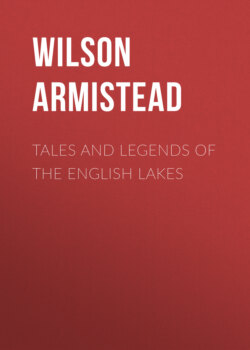Читать книгу Tales and Legends of the English Lakes - Wilson Armistead - Страница 17
На сайте Литреса книга снята с продажи.
ОглавлениеIN the early part of the summer of 1807, a very handsome young lady, apparently about twenty-two, came to the village of Hawes, and took lodgings there. She positively refused to tell either her name or the place of her residence. Her manners were highly accomplished, though her behaviour sometimes assumed a degree of wildness and incoherence, which raised doubts as to the state of her mind. Her dress was rather rich than splendid; and white was her customary attire. A broad pink ribbon was always tied round her waist, with two ends behind, reaching to her feet. It was observed that she took particular pleasure in seeing these ribbons flutter in the wind, as she rambled over the adjoining fells. Curiosity, that busy personage in most places, and particularly so in the village of Hawes was eager to trace the history of the mysterious visitor, but in vain. The most distant allusion to the subject always produced silence.
Some supposed that she was a young lady who had been crossed in love, and had fled hither to brood over her disappointment in solitude; indeed her conduct rather sanctioned such an opinion, for she kept no company. When she saw any one, it was to administer relief or to enquire after their wants.
Others thought she might be some young widow, who had chosen to linger out her existence in obscurity in such a secluded spot as that. This opinion did not want support for she was constant in her visits to all the widows in the village, beside lodging with one.
Others again thought she was betrothed to some military officer, and chose to escape the importunities of other lovers, by hiding herself here till peace should restore her future husband to her arms.
Such were a few of the many surmises which at that time constituted the tea-table gossip at Hawes. Though each party felt confident that its own opinion was right, it remained only vague conjecture; for the young lady herself never dropped a single hint which could in the least turn the scale of imagination to the side of certainty.
One evening, having taken her accustomed ramble, she did not return; and the widow with whom she lodged became extremely impatient and uneasy. Inquiries were made in all directions, but no one had seen her. Several young men volunteered to search her usual haunts, but nothing could be found.
For several weeks, and even months, the sudden disappearance of the fair stranger continued to occupy the principal attention of the village. Nor will this appear surprising, when you recollect that only seldom anything occurs in a place like that of a romantic nature; yet the hearts of the inhabitants are as open to the sympathies of humanity in that place as in others.
At last it was remembered that a carriage, with the blinds up, had called to water the horses at Mr. Clark's on that evening; and had driven forward without any one alighting. At the time it was considered to be an empty carriage; but when the fair stranger was found to have disappeared so mysteriously the same evening, it was concluded that she had been carried off by her friends in this very carriage.
Without attempting to explain how this was, she was never heard of after that day.
The picture I would draw from this story is simply this:—One of her usual walks was up the glen to Hardra waterfall. Every day, when the weather would permit, did she traverse this glen. After viewing the immense column of water which there is precipitated over the projecting rock into the unfathomable cistern at its foot, she would ascend the steep acclivity which leads to the top of the rock. Upon a natural rude column of stone on the left hand side, which appears to have been torn from the parent rock during some convulsion of nature, would she stand for hours, her long pink ribbons fluttering in the mountain breeze. I know of no finer subject than this for a picture. The broken and overhanging rocks—the loose fragments at their feet—the cascade itself, the finest in the country—the brook fretting and foaming down the rugged glen—the stunted trees, and matted foliage, which protrude from the fissures of this natural wall—the huge erect pillar of stone, which rears its detached mass above the adjoining rock—and one of the loveliest females I ever saw, attired in flowing white drapery, which, with the ribbons, fluttered and played upon the wind—could you find a subject equal to this for interest, one equal to it for sublimity and beauty?
